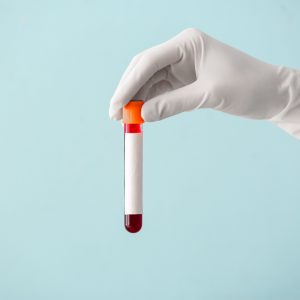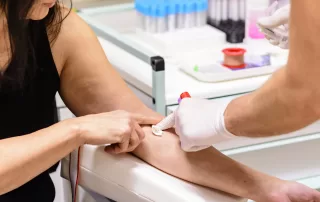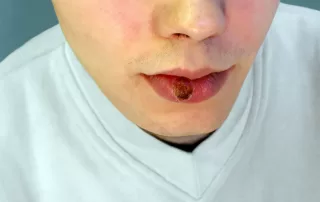Extended (urine & blood) STI test
Want to stay on top of your sexual health? With Qoctor’s online doctor service, you can request a pathology request form for STI (Sexually Transmitted Infection) testing- a urine test for chlamydia, gonorrhoea and mycoplasma genitalium and a blood test for HIV, Hepatitis B&C and Syphilis. First, you’ll need to answer some simple online questions, have a brief phone/video consultation with one of our doctors, then receive your pathology request form for download from your Qoctor account. Print the form and go to your local pathology collection centre to have your test(s) carried out. When we receive your results, they will be available to view on your Qoctor profile. You can book your free follow up”results appointment” to discuss the results if you wish to, or if the results are abnormal.
About extended STI (urine & blood) tests
Some STIs don’t have any symptoms, so you may have an infection without even knowing it. This can be a problem as you can pass the infection on to a sexual partner without being aware.
If an STI is not treated, you and/or your partner(s) could also end up with long term health problems. Getting regular sexual health check ups helps you to make sure you can be safe and confident in your sexual health.
A urine test can check for common infections such as Chlamydia, Gonorrhoea and Mycoplasma Genitalium, and a blood test can check you for HIV, Hepatitis B&C, and Syphilis.

Common Questions and Answers
In Australia, most pathology laboratories/collection centres will only conduct a pathology test if you have a referral from a registered doctor. While some labs can perform a very limited number of specific tests if a patient “self refers” (see below for details), in the vast majority of cases, a pathology referral/request from a doctor is required.
Self requesting blood tests/pathology tests
Most labs do not offer testing based on “self referral” because tests are expensive, and results are often complex to interpret. However there are some limited exceptions:
Dorevitch– No self-referral for blood tests
Australian Clinical Labs– No self-referral for blood tests.
QML Laboratories: Self referral/self request available for Blood Group, Hepatitis serology, MMR (measles mumps rubella) serology, Varicella (Chicken Pox) serology, Quantiferon Gold, Mantoux test, drug screening, alcohol breath test, COVID-19 swab.
4Cyte Laboratories No self-referral for blood tests
Please note that labs may change their policies over time, and the above is a guide only. Check with your local lab for further details.
The time it takes for pathology test results to come back depends on a number of factors. In most cases, it will just take a few business days. This may vary slightly, depending on the type of test, as well as the processing time at the pathology collection centre/laboratory you used. When Qoctor receives your results, and the doctor has checked it, we’ll inform you via SMS and/or email. Most results will also then also appear on your own Qoctor profile, where you can view them.
If you have not received an SMS or email notification about your test result within 1 week (4-5 business days) of having the test, please email Qoctor at info@qoctor.com.au OR use the live chat function on our home page- let us know the laboratory/pathology collection centre you attended, the date of the test, as well as your name and date of birth, and we can chase it up with the lab on your behalf, as soon as possible.
Please bear in mind, that many labs have limited staffing at weekends, so if you contact us at the weekend, we may not be able to access the result for you until they re-open on Monday.
Can I order my own blood tests in Australia?
In Australia, most pathology laboratories/collection centres will only conduct a pathology test if you have a referral from a registered doctor. While some labs can perform a very limited number of specific tests if a patient “self refers” (see below for details), in the vast majority of cases, a pathology referral/request from a doctor is required.
Will I need to pay the laboratory for a blood test?
The Australian healthcare system subsidises the cost of most common pathology tests for Australians who have a Medicare card. Therefore, your Medicare details should be included on the pathology request form. This is to encourage people to speak to their doctor about their health concerns, and to ensure that taxpayers’ money is being used wisely.
Are all pathology tests covered by Medicare?
It’s important to note that some tests are NOT covered by Medicare, or will only be covered a certain number of times per year- your doctor will usuallly flag this with you in advance, and the pathology collection centre will generally draw your attention to this too.
Will I need to pay for a blood test if I don’t have Medicare?
If you don’t have Medicare, you can still get tested using a pathology request form, but you will be invoiced by the pathology laboratory afterwards (be sure to enquire about the cost beforehand). In this case, you may be covered by health insurance and can claim it back- check your policy.
How to get a valid pathology referral
A pathology referral can be obtained by speaking to a registered Australian doctor- this can be a face to face consultation or a telehealth appointment via phone call or video call. Some online providers only assess people via an online questionnaire or SMS, without a phone/video call- this is not best practice and may lead to issues with your Medicare rebates down the track- that’s why it is important to stick with providers who conduct a proper telehealth consult (as Qoctor does).
Self requesting blood tests/pathology tests
Most labs do not offer testing based on “self referral” because tests are expensive, and results are often complex to interpret. However there are some limited exceptions:
Dorevitch– No self-referral for blood tests
Australian Clinical Labs– No self-referral for blood tests.
QML Laboratories: Self referral/self request available for Blood Group, Hepatitis serology, MMR (measles mumps rubella) serology, Varicella (Chicken Pox) serology, Quantiferon Gold, Mantoux test, drug screening, alcohol breath test, COVID-19 swab.
4Cyte Laboratories No self-referral for blood tests
Please note that labs may change their policies over time, and the above is a guide only. Check with your local lab for further details.
With Qoctor, you can request a blood test to screen for HIV, Hepatitis B & C, and Syphilis. These are all serious bloodborne infections, and require specialist treatment if detected. Many people wish to have these tests performed at the same time they are having their urine test for more common sexually transmitted infections such as Chlamydia, Gonorrhoea and Mycoplasma Genitalium.
Health Library- Sexual Health
HIV Self-Testing: How It Works and What You Should Know
HIV Self-Testing: How It Works and What You Should Know Human immunodeficiency virus (HIV) is commonly checked as part of a routine sexual health check, either through your GP or a sexual health clinic. However, HIV self-testing has emerged as a convenient and private alternative for those who prefer to test at home. Book an STI test consultation HIV statistics and risk factors HIV is a virus you can contract through sex or blood-to-blood transmission. It commonly does not have any symptoms initially but over time can affect your immune system and put you at increased risk of certain cancers and infections. According to 2020 statistics, 2,610 people were unaware they had HIV in Australia. Risk factors for getting HIV include being a man who has sex with other men or using intravenous drugs. However, anyone [...]
Balanitis: Signs, triggers, and how to treat it
Balanitis: Signs, triggers, and how to treat it Balanitis is inflammation of the head of the penis (glans). It can cause symptoms such as irritation of the glans, redness, discomfort, swelling, small spots or discharge that is white and thick (or cheesy). There are many causes of balanitis, including dermatitis, irritants, fungal infection, bacterial infection, physical rubbing, yeast infection, poor hygiene, and also overzealous cleaning. Book a GP appointment Risk factors for balanitis Balanitis is much more likely to occur in men who are uncircumcised because the glans is covered by the foreskin, which creates a moist, closed, and warm environment for bacteria and fungi to overgrow. Balanoposthitis: A related condition Another condition, balanoposthitis, means inflammation of the foreskin and glans, which has the same triggers and causes as balanitis. [...]
Syphilis
Syphilis As one of the oldest sexually transmitted infections (STI) still present today, syphilis continues to make its mark in the 21st century. In 2023, there were over 8,000 notifications for syphilis in Australia, up from over 2,000 in 2010. Worldwide in 2022 there were 8 million adults with syphilis and 700,000 babies born with congenital syphilis. It is an infection that has famously been claimed to have affected Casanova, Oscar Wild, Fyodor Dostoevsky, Ludwig van Beethoven and Vincent Van Gough, while also creating tension between kingdoms and countries in the past. Book an STI test So, what is syphilis? It is a bacteria that can be transmitted during sex through the mouth, penis, vagina and anus. It can also be transmitted in blood transfusions, intravenous drug use and pregnancy. In Australia, there are higher rates [...]



